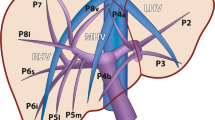Abstract
Background:
Unexpected fatal bleeding from the gallbladder bed during laparoscopic cholecystectomy is often associated with injury to the middle hepatic vein. This paper studies whether preoperative color Doppler ultrasound is effective in reducing the risk of injury. Also a venous classification is suggested.
Methods:
Between June 1999 and February 2004, 2,146 patients undergoing laparoscopic cholecystectomy by standard method received preoperative color Doppler ultrasound examinations. The closest distance between the hepatic vein and the gallbladder was studied. Also, cases of liver cirrhosis, number of conversions to open cholecystectomy, intraoperative blood loss, operative time, complications, and hospital stay were recorded (group D). At the end of the study, we retrospectively reviewed the same parameter of another 2,146 patients who received laparoscopic cholecystectomy without preoperative color Doppler ultrasound between the period of March 1995 and June 1999 (group ND).
Results:
In group D, 108 patients had cirrhosis. Four hundred and ninety-six patients (27 cases of cirrhosis) had a closest distance of 1 mm or less between the vein and the gallbladder. There were two conversions to open cholecystectomy, but none related to gallbladder bed bleeding. In group ND, there were five conversions, including four cases of gallbladder bed bleeding from the middle hepatic vein and one case of severe adhesion. The conversion rate was significantly higher. In group ND, the mean intraoperative blood loss in the cases of liver cirrhosis was significantly greater. Also, the operative time of patients with the closest vein and gallbladder distance of 1 mm or less in group D was significantly longer.
Conclusions:
Color Doppler ultrasound is an effective method for detecting the presence of potential bleeders. Although the operative time will be a bit longer, the operation can be done under meticulous care and complete preparation, so that the conversion rate and the risk of fatal hemorrhage can be reduced, especially in patients with liver cirrhosis.


Similar content being viewed by others
References
Aranha GV, Sontag SJ, Greenlee HB (1982) Cholecystectomy in cirrhotic patients: a formidable operation. Am J Surg 143:55–60
Baev ST, Pozarliev T, Todorov GT (1995) Laparoscopic cholecystectomy: 700 consecutive cases. Int Surgl 80:296–298
Bouchier IA (1969) Postmortem study of the frequency of gallstones in patients with cirrhosis of the liver. Gut 10: 705–710
Colonval P, Navez B, Cambier E, Richir C, de Pierpont B, Scohy JJ, Guiot P (1997) Is laparoscopic cholecystectomy effective and reliable in acute cholecystitis? Results of a postoperative study of 221 pathologically documented cases. Ann Chir 51:689–696
Cosgrove DO, Arger PH, Coleman BG (1987) Ultrasonic anatomy of hepatic veins. J Clin Ultrasound 15: 231–235
Deziel DJ, Millikan KW, Economous SG, Doolas A, Ko ST, Airan MC (1993) Complications of laparoscopic cholecystectomy: a national survey of 4,292 hospitals and an analysis of 77,604 cases. Am J Surg 165: 9–14
Doberneck RC, Sterling WA, Allison DC (1983) Morbidity and mortality after operation in nonbleeding cirrhotic patients. Am J Surg 146:306–309
Kapoor VK, Kumar A, Sikora SS, Kaushik SP (1995) Conversions in laparoscopic cholecystectomy—need for a new nomenclature. Trop Gastroenterol 16:38–39
Lee VS, Chari RS, Cucchiaro G, Meyers WC (1993) Complications of laparoscopic cholecystectomy. Am J Surg 165: 527–532
Lujan JA, Parrilla P, Robles R, Main P, Torralba JA, Garcia-Ayllon J (1998) Laparoscopic cholecystectomy vs open cholecystectomy in the treatment of acute cholecystitis: a prospective study. Arch Surg 133:173–175
Nenner RP, Imperato PJ, Alcorn CM (1992) Complications of laparoscopic cholecystectomy in ageriatric population group. NY State J Med 12:518–520
Nicholas P, Rinaudo PA, Conn HO (1972) Increased incidence of cholelithiasis in Laennec’s cirrhosis: postmortem evaluation of pathogenesis. Gastroenterology 63:112–121
Reddick E, Saye WB, Corbitt JD Jr, (eds) (1993) Atlas of laparoscopic surgery. Raven Press, New York
Schafer M, Krahenbuhl L, Farhadi J, Buchler MW (1998) Cholelithiasis—laparoscopy or laparotomy? The Umsch 55: 110–115
Schumpelick V, Schippers E (1991) Cholecystectomy: laparoscopic or conventional? Zeitschr Gastroenterol 29: 659–662
Schwartz SI (1981) Biliary tract surgery and cirrhosis: a critical combination. Surgery 90: 577–583
Schwesinger WH, Kurtin WE, Levine BA, Page CP (1985) Cirrhosis and alcoholism as pathogenetic factors in pigment gallstone formation. Ann Surg 201: 319–322
Scotte TR, Zucker KA, Bailey RW (1992) Laparoscopic cholecystectomy: a review of 12,397 patients. Surg Laparosc Endosc 2: 191–198
Shen BY, Li HW, Chen M, Zheng MH, Zang L, Jiang SM, Li JW, Jiang Y (2003) Color Doppler ultrasonographic assessment of the risk of injury to major branch of the middle hepatic vein during laparoscopic cholecystectomy. Hepatobili Pancreat Dis Int 2:126–130
Takeyuki M, Masato K, Katsumaro S, Yasuki U, Ryuzo M, Kazuhiko Y, Susumu K, Yoji Y (1999) Ultrasonographic assessment of the risk of injury to branches of the middle hepatic vein during laparoscopic cholecystectomy. Am J Surg 178: 418–421
Author information
Authors and Affiliations
Corresponding author
Rights and permissions
About this article
Cite this article
Yau, HP., Lee, KT., Kao, EL. et al. Color Doppler Ultrasound Detection and Classification of the Tangential Hepatic Vein before Laparoscopic Cholecystectomy. Surg Endosc 19, 1377–1380 (2005). https://doi.org/10.1007/s00464-004-2251-y
Received:
Accepted:
Published:
Issue Date:
DOI: https://doi.org/10.1007/s00464-004-2251-y




